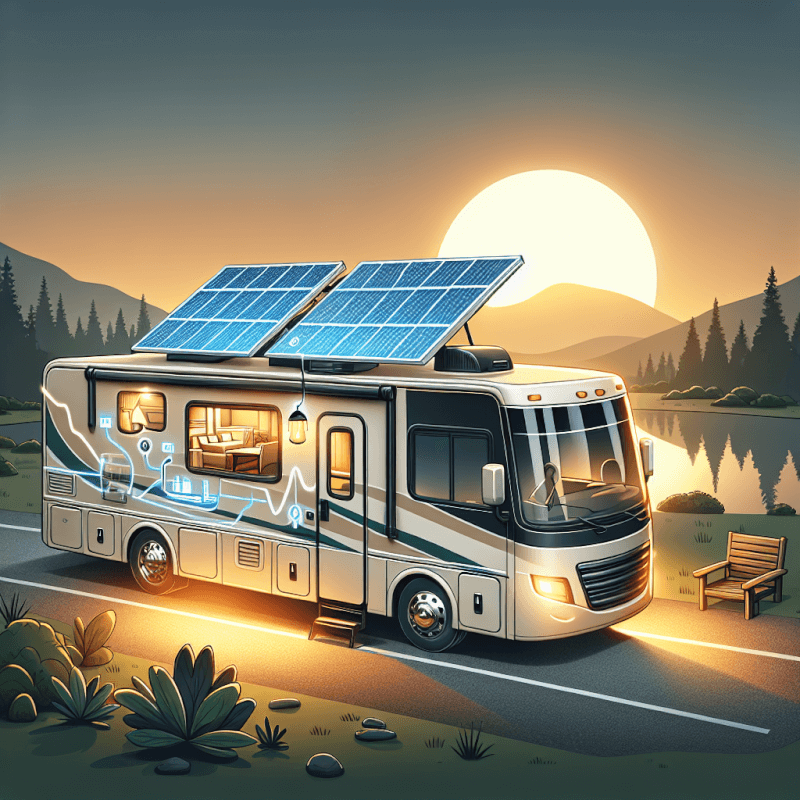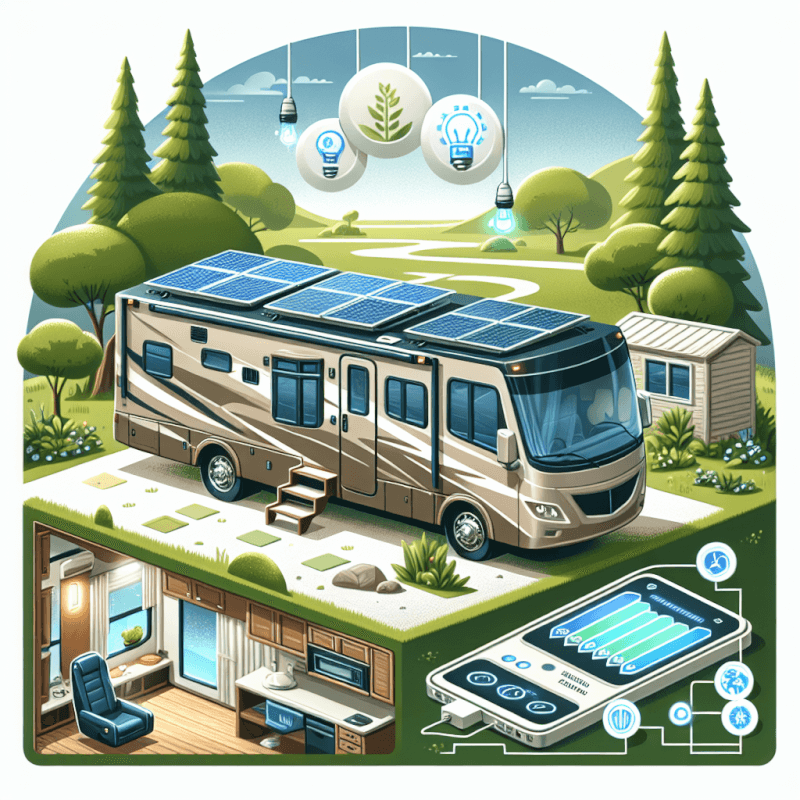If you’re a proud owner of an RV and looking to maximize energy efficiency on your road trips, you’ve come to the right place. In this article, we’ll explore various tips and tricks that can help you make your RV more energy-efficient. From simple modifications to smart appliance choices, we’ll guide you towards a more eco-friendly and cost-effective journey on the open road. So grab a cup of coffee, sit back, and let’s embark on this energy-saving adventure together.

Insulation
Check existing insulation
When it comes to making your RV energy-efficient, one of the first steps you should take is to check the insulation in your vehicle. Insulation plays a crucial role in maintaining a comfortable temperature inside your RV, as it helps to keep the cold air out during the winter and the hot air out during the summer. Check for any gaps or areas where the insulation may be lacking, and seal them accordingly.
Add more insulation to walls and roof
If you notice that your RV lacks sufficient insulation, consider adding more insulation to the walls and roof. This can help prevent thermal transfer and keep your RV cooler in the summer and warmer in the winter. There are various insulation options available, such as foam insulation or reflective insulation, which can be easily installed to improve the energy efficiency of your RV.
Insulate windows and doors
Another important aspect of RV insulation is insulating windows and doors. Windows and doors can be a significant source of heat transfer, so it’s essential to minimize this to maintain a comfortable interior temperature and reduce the workload on your heating and cooling systems. Install window coverings, such as reflective shades or blackout curtains, to prevent heat gain in the summer and heat loss in the winter.
Lighting
Switch to LED lights
One of the easiest ways to make your RV more energy-efficient is by switching to LED lights. LED lights are much more efficient compared to traditional incandescent bulbs, as they use significantly less power and last much longer. By replacing all your RV’s lights with LEDs, you can reduce your energy consumption and save money in the long run.
Install motion sensor lights
Installing motion sensor lights in your RV can be a great energy-saving strategy. These lights only turn on when they detect motion, which means they won’t be left on accidentally and waste energy unnecessarily. Motion sensor lights are particularly useful for outdoor areas like your RV’s entrance or camping setup, providing safety and convenience while conserving energy.
Make use of natural light
Maximizing the use of natural light can drastically reduce your dependency on artificial lighting inside your RV. Whenever possible, open the blinds or curtains during the day to allow natural light to illuminate your space. Not only does this save energy, but it also creates a warm and inviting atmosphere inside your RV.

Appliances
Upgrade to energy-efficient appliances
Consider upgrading your RV’s appliances to energy-efficient models. Energy-efficient appliances use less power to operate, helping to lower your overall energy consumption. Look for appliances with ENERGY STAR ratings, as they are certified to meet strict energy efficiency guidelines. When shopping for new appliances, consider the size and power requirements to ensure compatibility with your RV’s electrical system.
Unplug unused appliances
Even when not in use, appliances left plugged in can still consume a significant amount of power, known as standby power or “vampire” power. To prevent this unnecessary energy drain, make it a habit to unplug unused appliances or use power strips with switches to easily turn them off. This simple habit can lead to noticeable energy savings over time.
Use propane for cooking and heating
Opting for propane as a source of energy for cooking and heating can be a more energy-efficient choice for your RV. Propane-powered appliances generally use less electricity compared to their electric counterparts. Additionally, propane is a versatile and readily available fuel, making it a popular choice among RV owners looking to reduce their energy consumption.
Heating and Cooling
Utilize proper ventilation
Proper ventilation is crucial for maintaining a comfortable temperature inside your RV. When using heating or cooling systems, ensure that vents and air ducts are clean and free from obstructions. Additionally, use ceiling fans or portable fans strategically to promote air circulation and distribute conditioned air more efficiently. By optimizing ventilation, you can minimize the strain on your heating and cooling systems, ultimately reducing energy usage.
Use reflective shades or window coverings
To prevent excessive heat gain from direct sunlight, consider using reflective shades or window coverings. These accessories are designed to reflect the sun’s rays, reducing solar heat gain and keeping your RV cooler. With less heat entering your RV, your air conditioning system won’t have to work as hard to maintain a comfortable temperature, resulting in energy savings.
Consider a programmable thermostat
Investing in a programmable thermostat for your RV can greatly enhance energy efficiency. With a programmable thermostat, you can set specific temperature schedules based on your needs. For example, you can program your thermostat to lower the temperature during the night or when you’re away from your RV. This way, you can optimize your heating and cooling systems without wasting energy unnecessarily.

Water Usage
Install low-flow faucets and showerheads
Reducing water consumption not only helps conserve water but also reduces the amount of energy required to heat water. Installing low-flow faucets and showerheads in your RV can significantly decrease water usage without compromising functionality. These fixtures restrict water flow while still providing a satisfying shower experience, making them an excellent addition for an energy-efficient RV lifestyle.
Fix any leaks
Leaky faucets or pipes can waste a significant amount of water, as well as energy used to heat that water. Regularly inspect your RV’s plumbing system and promptly fix any leaks you come across. This simple maintenance task can save you money on water bills, conserve water resources, and contribute to an overall more energy-efficient RV.
Reuse graywater for outdoor purposes
Graywater, which refers to wastewater from sources such as sinks and showers, can be reused for outdoor purposes such as watering plants or flushing toilets. Setting up a graywater recycling system in your RV allows you to put this water to good use instead of letting it go to waste. By reusing graywater, you can minimize the strain on your fresh water supply and reduce energy used for water filtration and pumping.
Solar Power
Install solar panels
Harnessing the power of the sun is a fantastic way to make your RV more energy-efficient. Installing solar panels on the roof of your RV can generate clean and renewable energy, reducing your dependence on traditional power sources. Solar panels can charge your RV’s batteries, power your appliances, and even save you money on campground electricity fees. Consider consulting with a professional to determine the suitable solar panel setup for your RV.
Use portable solar chargers
If installing solar panels on your RV seems like a significant undertaking, you can still benefit from solar power by using portable solar chargers. These compact and lightweight chargers can be easily carried and used to charge your electronic devices, batteries, or RV accessories. Portable solar chargers are particularly useful when boondocking or during outdoor activities, providing you with a convenient and eco-friendly energy source.
Invest in solar-powered accessories
To further enhance your RV’s energy efficiency, consider investing in solar-powered accessories. There is a range of solar-powered products available for RVs, such as solar-powered vent fans, solar-powered refrigerators, and solar-powered water heaters. By utilizing these accessories, you can reduce your reliance on traditional energy sources and take advantage of the sun’s abundant energy.

Battery Management
Monitor battery usage
Understanding and monitoring your RV’s battery usage is essential for optimizing energy efficiency. Keep track of how much power your batteries are consuming and how long they last under different usage scenarios. By monitoring battery usage, you can identify any anomalies or areas for improvement, allowing you to make necessary adjustments and maximize battery efficiency.
Charge batteries efficiently
Properly charging your RV’s batteries is crucial to maintaining their longevity and maximizing their energy storage capacity. Consider investing in a high-quality battery charger that is specifically designed for your RV’s batteries. Follow the manufacturer’s instructions for charging and avoid overcharging or undercharging, as this can result in reduced battery performance. By charging your batteries efficiently, you can prolong their lifespan and ensure they are ready to power your RV when you need them.
Consider upgrading to lithium batteries
If you’re looking for a significant improvement in battery performance and efficiency, consider upgrading to lithium batteries. Lithium batteries have a higher energy density, longer lifespan, and faster charging capabilities compared to traditional lead-acid batteries. While lithium batteries may have a higher upfront cost, their superior performance and efficiency make them a worthwhile investment for RV owners aiming for optimal energy efficiency.
Energy Monitoring
Install an energy monitor
Installing an energy monitor in your RV provides real-time data on your energy usage, helping you identify areas of improvement and make informed decisions about energy conservation. Energy monitors measure the electricity consumption of individual appliances or the overall energy usage in your RV. By understanding exactly how much energy is being utilized, you can make adjustments to reduce waste and maximize efficiency.
Track and analyze energy usage
Once you have an energy monitor set up, it’s essential to regularly track and analyze your RV’s energy usage. Pay attention to patterns and trends in energy consumption, such as spikes during certain activities or times of day. By visually seeing your energy usage data, you can identify any energy-draining habits or systems that may need attention. This knowledge empowers you to make conscious changes and develop energy-efficient habits.
Identify areas of improvement
By combining the data from your energy monitor and your own observations, you can identify specific areas of improvement in your RV’s energy efficiency. Assessing the information gathered will allow you to pinpoint high-energy-consuming appliances, inefficient habits, or potential upgrades that can make a significant impact. With this knowledge, you can take proactive steps to improve your RV’s overall energy efficiency and reduce your environmental footprint.

Driving Habits
Drive at a steady speed
One often overlooked aspect of energy efficiency in an RV is driving habits. Maintaining a steady speed when driving can significantly impact fuel consumption and energy usage. Avoid unnecessary acceleration or sudden braking, as these actions can waste fuel. By driving at a consistent speed, you can optimize your RV’s engine performance and conserve energy while on the road.
Avoid unnecessary idling
When parked or waiting, it’s important to avoid unnecessary idling of your RV’s engine. Idling for extended periods consumes fuel and emits unnecessary exhaust emissions. Instead, consider turning off your engine and using battery-powered equipment, such as fans or entertainment systems. By reducing idling time, you can conserve fuel, lower emissions, and increase your RV’s overall energy efficiency.
Use cruise control on highways
Using cruise control when driving on highways can enhance your RV’s energy efficiency. Cruise control helps maintain a constant speed, which can optimize fuel consumption. By freeing your foot from constantly adjusting the accelerator, you can minimize the likelihood of unnecessary speed changes that can waste fuel. Utilizing cruise control allows you to enjoy a more relaxed and energy-efficient driving experience.
Maintenance
Regularly maintain and clean appliances
Regular maintenance and cleaning of your RV’s appliances are crucial for keeping them in top shape and maximizing energy efficiency. Follow the manufacturer’s recommendations for routine maintenance, such as cleaning or replacing filters, inspecting for leaks, and ensuring proper airflow. By taking care of your appliances, you can prevent energy waste and extend their lifespan.
Check and replace air filters
Air filters play a vital role in maintaining proper airflow and efficient operation of your RV’s heating, ventilation, and air conditioning (HVAC) system. Regularly check and clean or replace air filters as needed to ensure optimal performance. Clogged or dirty air filters can restrict airflow, causing your HVAC system to work harder and consume more energy. By keeping your air filters clean, you can improve your RV’s energy efficiency and indoor air quality.
Ensure proper tire inflation
Maintaining proper tire inflation is not only essential for safety but also for energy efficiency. Underinflated tires can increase rolling resistance, leading to decreased fuel efficiency. Regularly check your RV’s tire pressure and inflate them to the manufacturer’s recommended levels. By keeping your tires properly inflated, you can minimize resistance and improve your RV’s overall energy efficiency while on the road.
By following these energy-efficient practices, you can make a significant impact on reducing your RV’s energy consumption, saving money on energy costs, and minimizing your environmental footprint. Each step, from insulation and lighting to appliances and driving habits, contributes to a more sustainable RV lifestyle. Embrace these changes and enjoy the benefits of a comfortable, energy-efficient RV journey.


